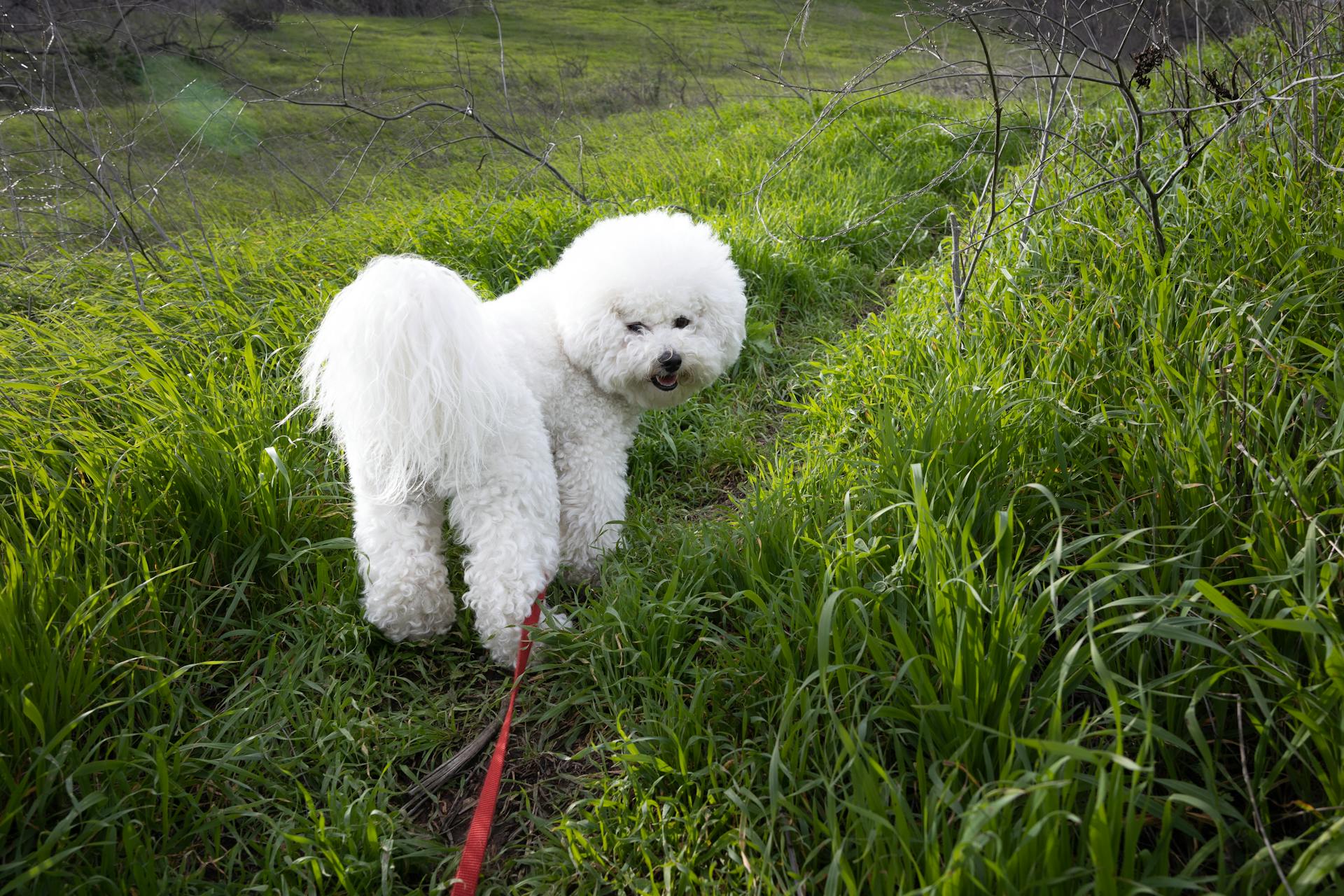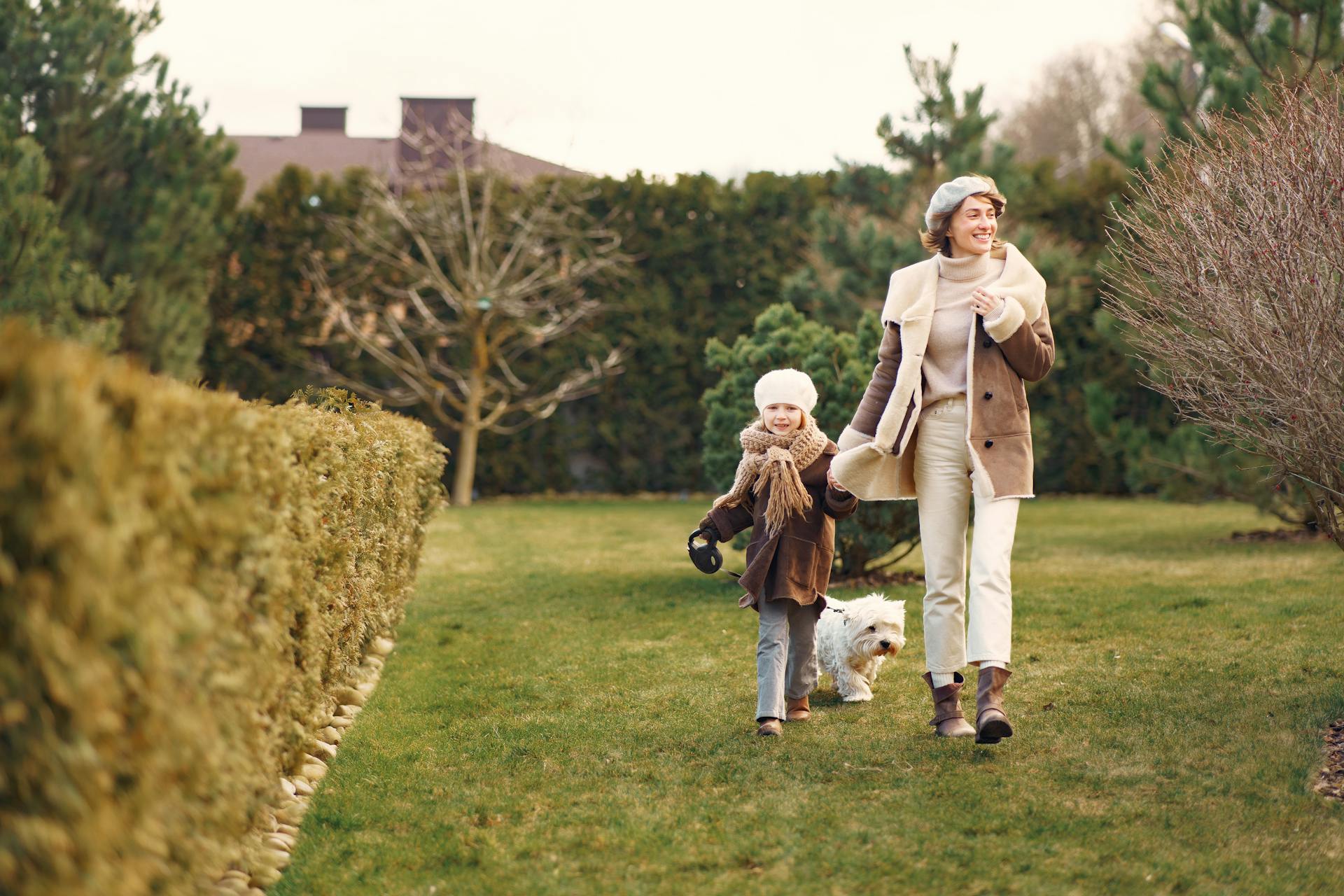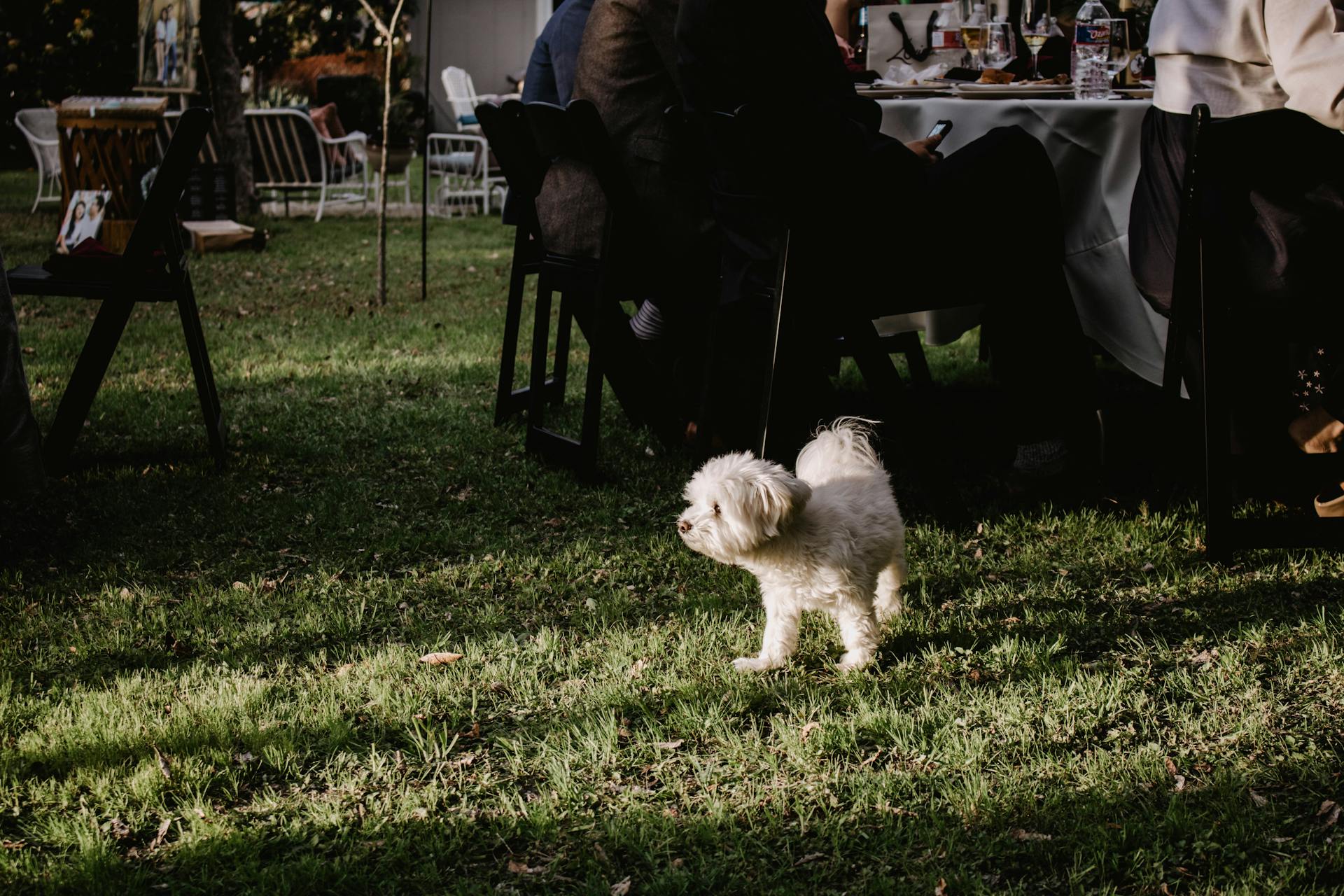
Bichon Frises typically live for 12-15 years, but their lifespan can be affected by various health issues.
Their small size and adorable appearance can make them prone to obesity, which can lead to serious health problems.
Regular exercise and a balanced diet are crucial to maintaining their weight and overall health.
A Bichon Frise's lifespan can be shortened if they develop liver disease, a common health issue in this breed.
Feeding & Diet
Bichon Frises are known to live a relatively long life, but their diet plays a crucial role in their overall health and lifespan. A high-quality, breed-appropriate food is essential for Bichon Frises.
Bichon Frise puppies should be fed three to four small meals a day until they're six months old, after which they can be fed twice a day. This will help prevent overfeeding and ensure they grow at a healthy rate.
It's essential to choose a meat-based, grain-inclusive diet that's suitable for your Bichon Frise's age and size. Grain-free diets can be associated with certain health problems, so it's best to avoid them unless your dog is allergic to grains.
Bichon Frises don't require much exercise, but that doesn't mean they can eat as much as they want. Overfeeding can lead to obesity, which can take years off their life.
Here are some feeding guidelines to keep in mind:
- Feed your Bichon Frise puppy three to four small meals a day until they're six months old.
- Feed your adult Bichon Frise twice a day.
- Choose a meat-based, grain-inclusive diet that's suitable for their age and size.
- Monitor their weight and adjust feeding as necessary to prevent obesity.
Common Health Issues
Bichon Frises are prone to dental problems, including periodontal disease, which can lead to tooth loss and affect overall health.
Regular dental care, including brushing and professional cleanings, is essential to prevent these issues and maintain their well-being.
Bichon Frises are susceptible to certain health conditions, including allergies, bladder stones, and joint issues like patellar luxation.
Early detection and appropriate treatment are key to managing health issues effectively.
Dental issues are prevalent in Bichon Frises due to their small mouths, which can lead to overcrowding of teeth and a higher propensity for plaque and tartar buildup.
Preventing dental issues involves regular at-home teeth brushing, using dental chews and toys designed to reduce plaque, and scheduling professional dental cleanings with your veterinarian.
Bichon Frises can experience joint issues like patellar luxation and hip dysplasia, which can affect their mobility and quality of life.
Regular veterinary care is crucial for the early detection and management of these conditions.
Bichon Frises may develop bladder stones, which can lead to urinary tract problems.
Cushing’s disease, although less common, can impact their overall health if not treated.
Dental and Hip Health
Bichon Frises are prone to dental problems, including periodontal disease, which can lead to tooth loss and affect overall health. Regular dental care, including brushing and professional cleanings, is essential to prevent these issues.
Their small mouths can lead to overcrowding of teeth, making them more susceptible to plaque and tartar buildup. This can result in periodontal disease, which can have systemic effects on the dog's health.
Dental issues are prevalent in Bichon Frises, largely due to their small mouths. Regular at-home teeth brushing, using dental chews and toys, and scheduling professional dental cleanings can prevent many dental problems.
Bichon Frises can suffer from hip dysplasia, a condition that affects the hip joints and can lead to arthritis. Maintaining a healthy weight and appropriate exercise can help manage symptoms.
Hip dysplasia is less common in Bichon Frises than in larger breeds, but it's still a concern that can affect their mobility and quality of life.
Preventive Care Essentials
Regular vaccinations are crucial to protect your Bichon Frise against common infectious diseases.
Preventing parasites like fleas, ticks, and worms is also essential through regular treatments.
Spaying or neutering your Bichon Frise can prevent certain types of cancer and reduce the risk of behavioral and health issues related to the reproductive system.
Dental care, including regular brushing and professional cleanings, is vital to prevent periodontal disease, which can impact overall health.
Regular health check-ups can help detect any potential issues early on.
Screening for breed-specific conditions such as patellar luxation, hip dysplasia, and allergies can allow for early intervention and management.
Establishing a comprehensive preventive care plan with your veterinarian ensures your Bichon Frise receives the necessary care to lead a long, healthy life.
Bichon Frises are susceptible to certain health conditions, including allergies, bladder stones, and joint issues like patellar luxation.
Grooming and Hygiene

Regular grooming is essential for a Bichon Frise's health and comfort, and it goes beyond just making them look good. Routine brushing prevents matting and distributes natural skin oils, promoting a healthy coat and skin.
Bathing with a gentle dog shampoo can help manage skin conditions and keep their coat clean, especially in areas prone to infections like the eyes, ears, and paws. Paying attention to these areas can help prevent infections and keep your Bichon Frise healthy.
Regular grooming sessions also offer an opportunity to check for any unusual signs or changes in the dog's skin, ears, teeth, and nails, allowing for early detection of potential health issues.
Consider reading: How Do You Groom a Bichon Frise
Routine Grooming
Routine grooming is essential for your Bichon Frise's health and comfort. Regular brushing prevents matting and distributes natural skin oils, promoting a healthy coat and skin.
Bathing with a gentle dog shampoo can help manage skin conditions and keep their coat clean. Pay special attention to their eyes, ears, and paws, as these areas can harbour infections if not kept clean.
Regular grooming sessions also offer an opportunity to check for any unusual signs or changes in the dog's skin, ears, teeth, and nails, allowing for early detection of potential health issues. This can help identify health issues before they become serious, contributing to your Bichon's overall health and comfort.
Grooming plays a significant role in preventing skin irritation and infections by preventing matting and tangling. Regular grooming can also help control allergens and soothe sensitive skin, reducing the risk of allergies and skin conditions.
Keeping the nails trimmed helps maintain good paw health and posture.
How Grooming Affects a Dog's Health
Regular grooming is essential for a Bichon Frise's health and comfort, preventing matting and distributing natural skin oils to promote a healthy coat and skin.
Grooming plays a significant role in a Bichon Frise's health, going beyond just keeping their coat clean and looking its best.
Regular brushing and combing help prevent matting and tangling, which can lead to skin irritation and infections.
Bathing with appropriate dog shampoos can control allergens and soothe sensitive skin, reducing the risk of allergies and skin conditions.
Ear care is particularly important for Bichon Frises to prevent infections, given their propensity for ear problems.
Keeping the nails trimmed helps maintain good paw health and posture.
Grooming sessions also offer an opportunity to check for any unusual signs or changes in the dog's skin, ears, teeth, and nails, allowing for early detection of potential health issues.
Preventing dental issues involves regular at-home teeth brushing, using dental chews and toys designed to reduce plaque, and scheduling professional dental cleanings with your veterinarian.
Regular veterinary care is crucial for the early detection and management of common health issues that can affect a Bichon Frise's lifespan, such as dental problems, allergies, and joint issues.
Frequently Asked Questions
How long do Bichons live as females?
Bichon females typically live 14-16 years with proper care, but may be prone to genetic conditions like liver shunts and cataracts. Regular checkups can help detect these issues early on.
What is the cause of death of Bichon Frise?
Bichon Frises are prone to heart failure in their golden years, often caused by a weakened heart valve that allows blood to leak back into the heart. This condition can be a leading cause of death in the breed if left untreated.
Who is the oldest Bichon Frise?
The oldest recorded Bichon Frise is Afro Ken, who lived to be 18 years and 2 weeks old. He set the record in the UK before passing away in December 2021.
Can a Bichon Frise live 20 years?
Yes, some Bichon Frises can live up to 20 years or more with proper care and health. However, their average lifespan is between 14 to 16 years
How old was the longest living Bichon?
The longest reported age for a Bichon Frisé is 21 years, with unsubstantiated reports of a few reaching 22 years.
Sources
- https://www.petplan.co.uk/pet-information/dog/breed/bichon-frise/
- https://www.dogbreedslist.info/all-dog-breeds/bichon-frise.html
- https://iheartdogs.com/bichon-frise-lifespan-what-to-expect-how-to-help-a-bichon-frise-live-longer/
- https://www.animalfunfacts.net/pets/dogs/574-bichon-frise.html
- https://www.dogster.com/dog-health-care/bichon-frise-lifespan-how-long-do-they-live
Featured Images: pexels.com


